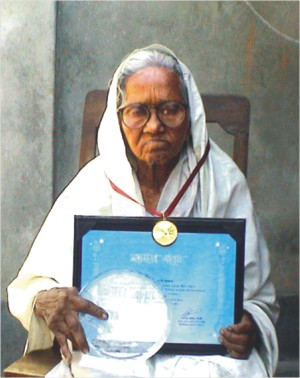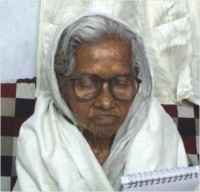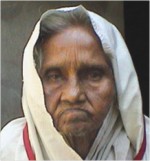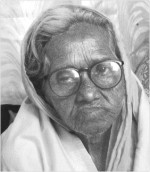| Cover Story
From Bogra
The Musings of Binapani Sarkar
Selina Sheuly
 The body clock has been defeated. Her face gleams with personality. Her character seems more like 29 than 92. Her body is old and wrinkled but mentally she is still as sharp as ever. This strength of hers has enabled a lot of helpless people to find strength. To her, her country and her countrymen come first. The body clock has been defeated. Her face gleams with personality. Her character seems more like 29 than 92. Her body is old and wrinkled but mentally she is still as sharp as ever. This strength of hers has enabled a lot of helpless people to find strength. To her, her country and her countrymen come first.
It was the sunny spring afternoon of 15 March 2007. The motorcars on the road to the north of Joypurhat District Town were making non-stop holler. If you keep going you hit a dirt road. The road then vanishes into a narrow alley. Even rickshaws can't make their way in. The road is so bad the rickshaw starts making creaking noises all over. Some tin-shed structures stand nearby. Next to that, there is a half-completed building and a porch leads to a small open yard. The lady sits in one side of the room. Every period of her life is full of richness. She has hundreds of memories, memories that give meaning to her life. She has heard dreadful stories about the 1757 Polashi War and the interminable torture of the British and the tales of oppression under their hands. She used to lament terribly while watching the drama, Nil Dorpon. The tales of woe would weigh down on her heart. Later on, she herself had united people to protest against British tyrants; only patriotism ran through her veins. She was influenced by Communism and the teachings of Mahatma Gandhi. She had even taken part in the Congress Revolution.
She has fought to stop conflict amongst communities, and has spread the value of reconciliation amongst people. She has fought for the establishment of human rights, and for women’s empowerment. She has fought to show people that women are equal to men. She cannot keep track of the order of all the events in her life, but she can remember and describe all of them.
I could tell that she was not physically feeling well. She had casually let her body rest against the wall of a verandah next to a kitchen. I felt bad just thinking of this woman having to walk around from alley to alley. She still visits all the neighbors, and keeps herself informed about the health and well being of the people around her. She collects money from those who are well off to pay for medical fees for the underprivileged. She runs to the hospital herself with poor patients. Her meals are minimal. Day and night she cares for underprivileged children as though they were her own.
A lot of people look down on her and pass comments; it doesn't bother her. Back in the day, a lot of people would come to her aid. Her life was never affluent; it was hard to even afford basic requirements for herself and her five children since her husband earned a very low income. But she had never been demoralized. She has dedicated herself to various humanitarian activities. At times, she has even worked with sports and women's associations as well. She has taught children to have a progressive mindset too.
 She would say; “children will bloom like flowers once the seed is planted in them.” She has never asked for anything in return. If anyone offered financial help, she would spend it on buying stationery or even food for her students. She would say; “children will bloom like flowers once the seed is planted in them.” She has never asked for anything in return. If anyone offered financial help, she would spend it on buying stationery or even food for her students.
Asked if she has had to face obstacles from society, she lets out a smile and says, “I was married when I was twenty two years of age. My husband was a member of Congress. I believed in Communism. Everyone said that we would definitely start fighting immediately. But, my husband said that we would each mind our own business and not meddle with each other. He said that he could help me in my work, it didn't matter that he didn't believe in what I believed in.” She has faced many difficulties in the process of her work, but at the same time she has learnt something every step of the way, which has enriched and emboldened her.
After the partition, the “Women's Organization” was formed. Prominent people like writer Romena Afaz, Amena Rahman and Sahara Majid were members. SDO Mokbul Shaheb encouraged Binapani Sarkar to start working in sports.
Binapani has grown up with politics from the very beginning. Her brothers used to believe in Communism. Some of them are still alive and living in India. Her brothers were comparatively better off, and this helped her in her ambitions towards social development. This is why she did not face much trouble before or after marriage. Her husband also played an important role in politics.
 When I asked her whether the lives of women then and now are the same or not, she answered in verse: Jonmile morite hobe/ Omor je kotha kobe/ Ohe jib korona krondon/ Manobjibon shar/ Emon pabena ar/ Bajjho drisshe nare mon/ Koro jotno, hobe joy/ Jibatta nitto noy/ Korona shukher aash/ Porona dukher fash/ Songshar somrongon majhe/ Juddho koro drirho kaje. (If you are born you die/ Do not speak of immortality/ Oh life do not cry/ Life ends/ You will not find another/ Mind does not look inward/ There will be victory/ The soul is not forever/ Don't long for happiness/ Don't be tied up in sorrow/ In the worldly life/ Fight with resolve.) When I asked her whether the lives of women then and now are the same or not, she answered in verse: Jonmile morite hobe/ Omor je kotha kobe/ Ohe jib korona krondon/ Manobjibon shar/ Emon pabena ar/ Bajjho drisshe nare mon/ Koro jotno, hobe joy/ Jibatta nitto noy/ Korona shukher aash/ Porona dukher fash/ Songshar somrongon majhe/ Juddho koro drirho kaje. (If you are born you die/ Do not speak of immortality/ Oh life do not cry/ Life ends/ You will not find another/ Mind does not look inward/ There will be victory/ The soul is not forever/ Don't long for happiness/ Don't be tied up in sorrow/ In the worldly life/ Fight with resolve.)
Binapani Sarkar has not had any formal education but is self-educated. She used to read the many books given to her by her brothers, and learnt a lot. Whenever she came across a new word, she asked teachers about it. She would spend nights solving mathematical problems. She has always had a lot of patience as well as a thirst for knowledge. She has even learnt many things by reading off scraps of paper. She still reads the newspaper as well as books, down to every detail. Her eyesight is not very good, but that doesn't stop her from trying to keep on reading.
I asked her, “What makes a woman successful?” She said “integrity, morality, and the unstoppable desire to keep working hard makes a woman strong and successful.” She thinks a woman should remain unmarried at least until the age of 27 because a woman should be independent by then. Only an educated, self-aware and complete woman can positively contribute to society.
I asked her what other women thought about her being involved in politics. She replied, “I always used to help women around me. They were very needy. I used to give them rice, clothes, I even taught their children for free. They didn't have a choice but to look up to me. Everyone revered and loved me.” She always saw that women suffered more in our society. She said, “Women contribute more to the family than men. If the husband dies, the woman takes charge of the whole family; but when the woman dies, the husband re-marries.” Binapani was widowed when her children were infants. She ran her family and managed her children all by herself. She understands that throughout history women have suffered a lot more than men in our society.
 When I asked her about women today, she said, “Women today are very progressive, they have demonstrated their talent and acumen. They are becoming teachers and doctors; they are playing vital roles in both the private and government sectors”. Regarding the inequality in wages she said, “Women in our society are neglected, they are not valued to the extent they deserve. Even if a woman does work equal to a man, she is paid less. Did she not give the same labor? Though the situation is better now. People have become much more aware. Women are getting much better salaries.” Some compare her to Mother Theresa, and others liken her to Begum Rokeya. When I asked her about women today, she said, “Women today are very progressive, they have demonstrated their talent and acumen. They are becoming teachers and doctors; they are playing vital roles in both the private and government sectors”. Regarding the inequality in wages she said, “Women in our society are neglected, they are not valued to the extent they deserve. Even if a woman does work equal to a man, she is paid less. Did she not give the same labor? Though the situation is better now. People have become much more aware. Women are getting much better salaries.” Some compare her to Mother Theresa, and others liken her to Begum Rokeya.
Recently she has been honored by Unilever Bangladesh Limited. She is delighted. This unexpected distinction has rekindled her sense of responsibility. Regretfully she says, “How much longer will I live? I have so much left to do.” She dreams of opening a library with the one lakh taka she received from Unilever.
The last few days in the life of this humanitarian is passing with the love of people around her. All she has had she has given to others. She says she is overflowing with happiness, and yet, with a touch of melancholy thinks about all the things she hasn't yet done.
Translated by Zahidul Naim Zakaria
Copyright
(R) thedailystar.net 2007 |
